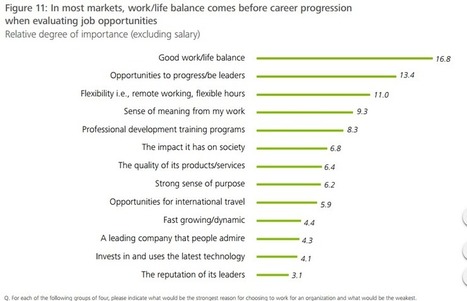 Your new post is loading...
 Your new post is loading...
We can't be the alpha dog all of the time. Whatever our personality, most of us experience varying degrees of feeling in charge. Some situations take us down a notch while others build us up. New research shows that it's possible to control those feelings a bit more, to be able to summon an extra surge of power and sense of well-being when it's needed: for example, during a job interview or for a key presentation to a group of skeptical customers. "Our research has broad implications for people who suffer from feelings of powerlessness and low self-esteem due to their hierarchical rank or lack of resources," says HBS assistant professor Amy J.C. Cuddy, one of the researchers on the study. In "Power Posing: Brief Nonverbal Displays Affect Neuroendocrine Levels and Risk Tolerance", Cuddy shows that simply holding one's body in expansive, "high-power" poses for as little as two minutes stimulates higher levels of testosterone (the hormone linked to power and dominance in the animal and human worlds) and lower levels of cortisol (the "stress" hormone that can, over time, cause impaired immune functioning, hypertension, and memory loss). The result? In addition to causing the desired hormonal shift, the power poses led to increased feelings of power and a greater tolerance for risk. "We used to think that emotion ended on the face," Cuddy says. "Now there is established research showing that while it's true that facial expressions reflect how you feel, you can also 'fake it until you make it.' In other words, you can smile long enough that it makes you feel happy. This work extends that finding on facial feedback, which is decades old, by focusing on postures and measuring neuroendocrine levels."
Via The Learning Factor
We live in an age of increased complexity, velocity and demand for multidisciplinary thinking. So much of what we do today requires the careful balance of both generalists and specialists to make great work happen. It excites me to see more and more organizations embrace this approach by bringing together people from multitudes of fields and perspectives, enabling a new depth and diversity of visioning and problem solving. Optimally, these multidisciplinary teams are further supported through evolved organizational and management-thinking that favors meritocracy over rigidity. Organizationally, this can be achieved by constructing horizontal networks where there were once more stacked seniority-based hierarchies. In practice, managing people and teams of this sort requires every bit as much care and rigor as more traditional structures, but the energies are directed differently — there's more attention directed toward supporting relevant possibilities and valuable outcomes than reinforcing structure. The investment is worthwhile, because when it works, the results and cultural implications are magnificent.
Via The Learning Factor
They said computers would make us all a lot more productive, and free up our personal lives. Is it just me, or was that all a big, fat porkie? The technology that was supposed to bring us this gift of freedom has entrapped us, eroding valuable time, energy and attention. Don't get me wrong, I love new technology. But let's take a reality check and go back to using it to help us do our jobs, not to dictate and distract every waking moment. Here are seven key productivity traps to be mindful of:
Via The Learning Factor
I like being happy. I like it so much that I’ve made more than a few difficult career decisions in order to avoid things that make me unhappy — things like working with people who treat me badly, long days trotting after carrots that always seem to hang just out of reach, and countless hours on planes, trains, and buses. Each “I would prefer not to” came at a professional and financial cost. But, hey, I figured, I’ve only got one life. So you can imagine the dismay I felt upon reading The Happiness Track: How to Apply the Science of Happiness to Accelerate Your Success (Harper One, 2016), by Emma Seppälä. In it, Seppälä, the science director of Stanford School of Medicine’s Center for Compassion and Altruism Research and Education, argues that the pursuit of happiness is actually a key to achieving professional success — not an obstacle to it. Unlike much of the literature about happiness at work, The Happiness Track doesn’t approach its subject from an organizational perspective. There are no free lunches on offer. Instead, Seppälä focuses on six personal “strategies for attaining happiness and fulfillment [that] may, in fact, be the key to thriving professionally.” If you’re familiar with the discipline of Positive Psychology, it’s likely that you’ll have run across these ideas before: be in the moment; nurture your resilience; manage your energy; access your creativity; be good to yourself; be compassionate.
Via The Learning Factor
I'm not here to patronize you. We know if you walk with better posture, force a fake smile, or get a new haircut you can trick your brain and boost your self-confidence. Perhaps for 20 minutes you'll think you're the next Richard Branson. I'm here to tell you there are proven ways to improve your self-confidence that will drive real, long lasting change in your life.
Via The Learning Factor
Is there a colleague with whom you have a strained working relationship? If, by chance, you are some kind of work superhero who just answered “no” to that question, is there at least someone with whom you would like to have a better relationship? If so, please ask yourself the following questions in relation to that person: Do you notice him as he truly is today, or based on your memory of how he was last week or last month – or even last year?When you have a conversation with him, is your only aim to change his mind? Or also to change your own?When you see his name in your inbox, do you already have a “story” about him, before even opening the email? These issues get to the heart (and brain) of executive mindfulness. While we know from research that mindfulness is good for us, what seems to be missing from the conversation is how one might be mindful at work, without meditating at our desks or breaking into a sun salutation. But an understanding of mindfulness – how it really operates in the context of daily work activities – is essential to good working relationships; relationships that let both us and our coworkers grow and change over time.
Via The Learning Factor
Before leaving work each day, employees at Ubiquity Retirement + Savings press a button in the lobby. They’re not punching out—not in the traditional sense, anyway. They’re actually registering their emotions. They have five buttons to choose from: a smiley face if they felt happy at work that day, a frowny face if they felt sad, and so on. This may sound like an HR gimmick (“See? Management cares how you feel!”) or an instrument of forced satisfaction (“The team with the most smiley faces wins!”). But it’s neither. Ubiquity is using the data it collects to understand what motivates employees—to learn what makes them feel a sense of belonging and excitement at work. Other organizations are starting to do the same. Some use apps that record how much fun people are having. Some hire technology consultants who specialize in the monthly, weekly, daily, or even hourly tracking of moods. Unfortunately, though, these organizations are in the minority. Most companies pay little attention to how employees are—or should be—feeling. They don’t realize how central emotions are to building the right culture.
Via The Learning Factor
Why do you need a personal brand? The fact is, you are constantly being Googled. Colleagues Google you at work, business partners Google you before a conference call, potential employers Google you before a job interview. What they are finding is the digital reality of ME Inc. It's your online CV but is it the online CV you want them to see? As Tim Ferriss, an author whose books have been No. 1 on the New York Times bestseller list, said recently: "Personal branding is about managing your name – even if you don't own a business – in a world of misinformation, disinformation, and semi-permanent Google records."
Via The Learning Factor
A recent study concluded that gender inequality is costing the global economy $12 trillion annually, with North America accounting for 25 percent of that total followed by China’s 20-plus percent. If diversity and gender equality have so much potential for improving business, why don’t we see more of it faster? What will be necessary to make it happen? There are several kinds of responses to this question. The first is the “do it yourself” response, characterized by Sheryl Sandberg’s now-famous argument in her book, Lean In. Among other things, she challenges women to change their behaviors, to bolster their self-confidence and ambition, and become better job and wage negotiators while choosing a partner who can help share the load of a career.
Via The Learning Factor
|
You're blurry-eyed and slack-jawed at your desk, staring at a to-do list so long you feel like you could wrap it around the entire earth -- twice. Yes, we've all found ourselves in this stressful situation every now and then. Facing a to-do list that feels completely unmanageable isn't fun. In fact, it's usually enough to make me want to curl up under my desk in the fetal position and hide until all of those pesky tasks dissolve away. But, unfortunately, that tactic has yet to work out for me. So, I've had to find another method to deal with my mile-long list of assignments. I've tried my fair share of productivity tips, tricks, and hacks that promise to help me grab the bull by the horns and conquer my to-do list with confidence and a healthy dose of strategy. However, I've found that most of those (although, not all!) really only manage to serve as a distraction and slow me down. Instead, I prefer to keep things basic, simple, and intuitive. So, when looking at my overwhelming to-do list, I always ask myself this one quick and easy question to pare down my tasks and channel my focus: Does this absolutely need to be done today? I know, it's so straightforward and obvious, you're likely groaning and rolling your eyes at me right now. But, it's actually an important inquiry that most people skip when creating their own lists. Humor me and allow me to dive in and explain why this question is so effective.
Via The Learning Factor
How do we improve who we are? The most effective--and often most difficult--way by far is to self-analyze. When we deconstruct our notions of ourselves and who we think we are, we are able to overcome potential obstacles standing in our way to becoming a better person. By answering these 5 questions you can begin the journey of becoming your best self. 1. If you had one day left to live, would you be ready to go? Although it's very easy for us to reach temporary states of complacency, reaching a level of complete fulfillment at life's end is a totally different story. So many of us end up going through the motions instead of actively enjoying what we do on a daily basis. Making sure we are content, right this moment, is a great way to keep this tendency in check.
Via The Learning Factor
Research shows that in leaderless groups, leaders emerge by quickly synchronizing their brain waves with followers through high quality conversations. Simply put, synchrony is a neural process where the frequency and scale of brain waves of people become in sync. Verbal communication plays a large role in synchronization, especially between leaders and followers. Synchrony between leaders and followers leads to mutual understanding, cooperation, coordinated execution of tasks, and collective creativity. On the surface, brain synchrony seems easy to understand. It simply implies that people are literally on the same wavelength. Yet, at a deeper level, interpersonal synchrony involves much more. Dr. Daniel Siegel explains that “presence”, “wholeness”, and “resonance” are at the core of the ability to develop synchrony. Recent advances in brain science can help leaders learn to synchronize with followers on these deeper levels:
Via The Learning Factor
There are a ton of qualities that can help you succeed, and the more carefully a quality has been studied, the more you know it's worth your time and energy. Angela Lee Duckworth was teaching seventh grade when she noticed that the material wasn't too advanced for any of her students. They all had the ability to grasp the material if they put in the time and effort. Her highest-performing students weren't those who had the most natural talent; they were the students who had that extra something that motivated them to work harder than everyone else. Angela grew fascinated by this "extra something" in her students and, since she had a fair amount of it herself, she quit her teaching job so that she could study the concept while obtaining a graduate degree in psychology at the University of Pennsylvania. Her study, which is ongoing, has already yielded some interesting findings. She's analyzed a bevy of people to whom success is important: students, military personnel, salespeople, and spelling bee contestants, to name a few. Over time, she has come to the conclusion that the majority of successful people all share one critical thing--grit. Grit is that "extra something" that separates the most successful people from the rest. It's the passion, perseverance, and stamina that we must channel to stick with our dreams until they become a reality.
Via The Learning Factor
Job-hopping millennials are getting older. Unlike previous generations of young people who eventually settled into a company for long-term financial security, the generation born between 1982 and 2004 isn't taking the bait, a new survey shows. "It's much easier to talk about your own growth and career trajectory if you express it as a literal journey between companies, rather than what you did at any one company," said Mac Schwerin, a 27-year-old copywriter who has changed jobs three times in as many years to get promoted. "It's easier to make the claim that you are the common denominator, that you are the one bringing successes with you wherever you go." Most of his peers agree. In a survey of millennials by Deloitte, two-thirds said they hoped to be working for a different organisation in five years or sooner. Deloitte polled 7500 working college-educated professionals in 29 countries for its fifth annual Global Millennials survey.
Via The Learning Factor
Are you a successful leader? This is a difficult question to answer: No matter how good you think you are, the only evidence of leadership is whether people follow you. Self-serving bias distorts your perception of your own successes and failures. Even if you’re incredibly self-aware, you may have trouble with an objective assessment because your direct reports may only appear to be following — they don’t get an option to be physically present — and not every company conducts rigorous engagement surveys or 360-degree reviews. So how can you gain a reasonably accurate understanding of your success as a leader? Try integrating three distinctive views.
Via The Learning Factor
It's a natural reaction. Everyone does it. You hear a problem and you immediately want to prescribe a solution--the perfect antidote--a master plan that will solve everything. But all too often, you give into the temptation to define a solution well before the full problem is articulated and explored. You're not the only one. Leaders at all levels are guilty of doing this. They hear a problem--the outlines of danger--and they rush to offer their agenda. In their desire to be helpful, they end up setting others on a path that may be costly--not only in resources but also in time. There are a number of reasons why presenting a solution right away has downsides. For example:
Via The Learning Factor
A little more than two years ago, Stanford GSB lecturer and serial board member David Dodson conducted an informal survey of company board members. He queried CEOs as well as the members, and compiled a list of best practices for these advisory panels.
Via The Learning Factor
Chances are you’ve heard a friend complain about having to "manage up." The act of managing up is often cast in a negative light — an inappropriate act of having to cover for a manager who would have otherwise let things fall through the cracks. But just as managing down to a team is a complex responsibility that requires much practice, so is managing up. Both are essential skills for career development, and both are far more involved than simply delegating work or picking up an extra project.
Via The Learning Factor
|



 Your new post is loading...
Your new post is loading...





































Nervous about an upcoming presentation or job interview? Holding one's body in "high-power" poses for short time periods can stimulate the brain and inspire confidence.